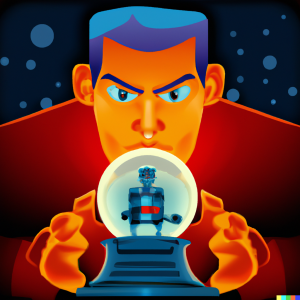How will artificial intelligence change the future?
In previous articles we explained: why generative AI represents a new paradigm in computing; the initial risks of implementing generative AI solutions; how those risks can be mitigated; the economic upside on offer; the potential downsides; and how AI could pose an existential threat to humanity. Now it’s time for the crystal ball: how will AI change the future?
So far, I have tried to present a balanced argument, highlighting both risks and benefits from a societal viewpoint. But the truth is that AI will impact everyone differently. Our individual perspective will be crucial in gauging that impact.
A Hypothetical Scenario: AI and Medical Services
Take the following scenario. Imagine an AI doctor has been developed that can converse with you about your symptoms, ask pertinent follow-up questions, then based on its analysis (backed by an encyclopaedic medical knowledge and your full medical history), it can prescribe treatments, order further tests, or make referrals to specialists. When combined with robotics (or even your own smartphone), such an AI doctor could also carry out visual examinations (looking in your ear/throat[1] or inspecting rashes and bumps on your skin[2]) and use audio sensors to diagnose chest infections or other respiratory problems[3].
From the perspective of its creator, such an AI doctor would have obvious benefits. It would be available 24×7. It could consult with as many patients as necessary at the same time (it would be infinitely scalable). Its marginal cost to operate would be peanuts – each consultation would expend less energy than making a piece of toast[4]. No one would ever have to wait for a doctor’s appointment. An excellent level of primary healthcare could be provided to the whole planet at a fraction of the cost. Who could possibly object to that?
Well, what about the millions of family doctors around the world? People who have dedicated their lives to studying and practicing medicine, even risking their own health by working through pandemics. Even if our Robo Doc was objectively better than any human equivalent, how could we introduce its benefits without discarding the expertise of existing medical practitioners. Could family doctors / general practitioners be upskilled to specialists and surgeons? What if those functions also became increasingly automated?
The value of disruption
In the world of business, it is easier to see disruptive innovation as positive. Innovative companies (‘disruptors’) offer consumers a unique and improved value proposition and are rewarded with growth, while the ‘disrupted’ are left behind. But what if an entire profession is disrupted? For society to fully harness the benefits of innovation through AI, we may need to start thinking now about mitigating the negative aspects that potentially entails.
In every field – AI will have champions and detractors. Its success will depend on many factors –demonstrating that it can do a good job, mitigating risks, combatting objections, navigating evolving regulations, and ultimately winning over the trust of customers. But whatever our personal views on AI, the march of technology will be difficult to stop.
Before we know it, Generative AI will be integrated into our everyday routines. Tools like Microsoft co-pilot and Google Duet will make it easier for everyone to draft emails and letters, summarise texts, take notes, translate documents, draft presentations, or even perform more complex tasks – like writing code to execute complex spreadsheet operations. LLMs will soon be embedded into digital assistants (like Cortana, Google Assistant, Siri, and Alexa) to provide much richer interactions. And it won’t be long before all forms of enterprise software will be leveraging some form of artificial intelligence.
These productivity boosting innovations will establish acceptance of the technology. This, in turn, will pave the way for more autonomous (and potentially disruptive) solutions further down the line.
Is the proliferation of AI inevitable?
When I was in my early 20’s I worked as a research analyst at a company called TowerGroup. Back then, I wrote a research note about biometric authentication. At the time, the average person’s opinion of biometrics was not positive. Why would anyone contribute data about their person? What if someone chopped off your hand or ripped out your eyeball to draw money from the ATM? My conclusion was that those fears could quickly be assuaged when using biometrics became the most convenient option (although the technology was accurate, the throughput was much slower).
20 years later I’m happily using the fingerprint scanner on my phone for that very reason – it’s more convenient. I rush to the biometric passport gates (and am relieved that they now accept ten-year-olds, as it means the whole family can go through) to save queueing time. And I happily use my voiceprint to authenticate myself with my telephone banking service because it’s more convenient than the alternatives.
Whether we like it or not, generative AI will soon be making everyone’s lives more convenient. Abstaining from using it will not prevent its widespread adoption. 30 years ago it wasn’t unusual to handwrite letters and send them by post. Nowadays, receiving a handwritten letter is an obscure treat – a sign that someone has taken time and consideration over their message. In another 30 years, it may be a treat to receive words formulated by a human being without the assistance of AI.
The pace of change
The other week I took my son to an exhibit at the Science Museum in London that offered an insight into the evolution of video games. It was great fun to see working examples of computers and consoles that I owned as a child (the original Atari console, Commodore 64, Amigas), and be able to play together on those machines. It was a very visual reminder of how technology had evolved over the last few decades – immensely better graphics, greater complexity, more immersive and interactive. Yet the core function of the applications – the gameplay – remained largely the same.
We now stand at the dawn of some radical changes in computing. The current wave of AI applications will transform the way we interact with computers. We have grown used to being in control of our technology. At times, we may have struggled with tech addiction and devoting too much time to our screens. But we always had the ability to switch them off. To take a break and step away into nature.
The existence of super-intelligent, autonomous computer programs that perform human-like functions represents a completely new game. The world of science fiction has never seemed closer. Our subservience to technology has never been greater, and will only keep growing. There are a multitude of ways in which AI can better society. Yet, equally, it is not difficult to foresee the downsides.
How will AI Change the Future: Utopia or Dystopia?
A couple of summers ago, I took the opportunity to re-read George Orwell’s 1984 and Aldous Huxley’s Brave New World (highly recommended to anyone concerned about our future). Both masterpieces – not necessarily as works of literature, but in their ability to foretell potential perils. Each book presents a unique view of a dystopian future: Orwell’s depiction of an oppressive totalitarian state; and Huxley’s subtler vision of an obsessive pursuit of pleasure and efficiency (at the expense of more important human values). But what they both share is a perception that dystopia involves a detachment from nature, and a breakdown of families and communities.
As we embark on our next wave of technological progress, I hope that we can all find ways to stay grounded. To cherish and cultivate the things that make us human. Our ability to laugh with friends, care for loved ones, enjoy a sense of community, and marvel at nature. Hopefully, AI will afford us more time to do that.
If we continue along the path that we are on, then I’m afraid there is quite a lot to worry about. AI could create cavernous divides in society, fuel fiercer competition, stoke civil unrest, further polarize politics, undermine democracy, and potentially threaten the existence of humankind. It will be up to every human to ensure that doesn’t happen.
[1] https://jhu.technologypublisher.com/technology/45928
[2] https://www.nature.com/articles/s41598-023-31340-1
[3] https://www.ncbi.nlm.nih.gov/pmc/articles/PMC8545201
[4] https://towardsdatascience.com/chatgpts-energy-use-per-query-9383b8654487


 DALL·E 2023-09-13 08.58.01
DALL·E 2023-09-13 08.58.01